Gimly’s Decentralized Identity Framework Is Built for Portability and Security
Gimly built a decentralized identify framework on EOSIO that offers users portability, security, and ease.
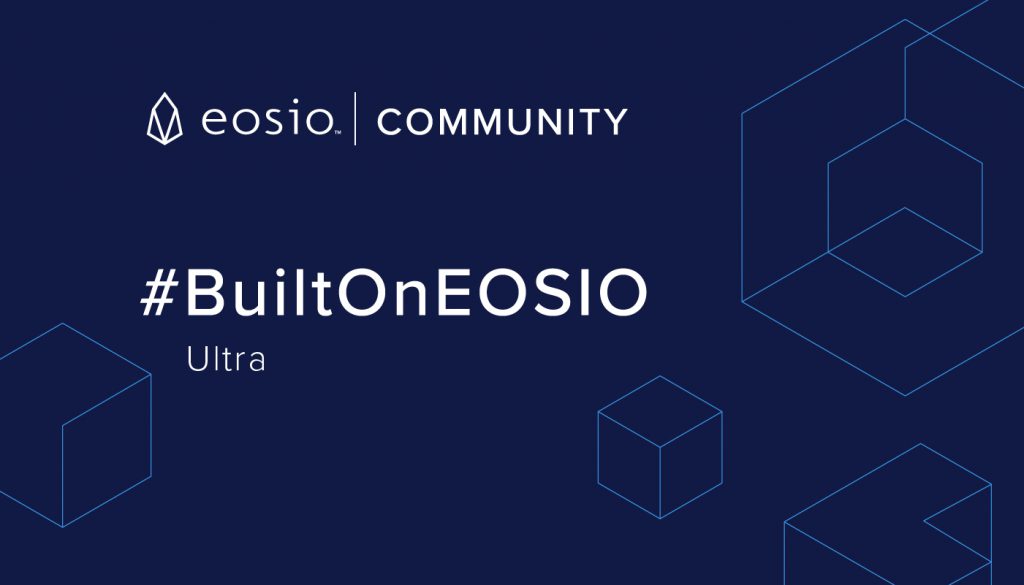
We recently spoke to Nicolas Gilot, co-CEO at Ultra, about their upcoming gaming platform built on EOSIO that offers content development toolkits to game developers.
Ultra is a blockchain-powered video game ecosystem which provides players, game developers, and influencers with unique and innovative tools and functionalities. Put simply, we’re building a blockchain for the video game industry.
We are building the first application on top of this blockchain, called Ultra Games. It is designed to be a distribution platform, like Steam, where players can buy all types of PC games. We are creating a framework which provides new features like game reselling, virtual item creation and trading, and referral systems, all powered by an EOSIO blockchain.
Third party developers and existing businesses within the industry can leverage our framework and user base, which will contribute to an even more flourishing ecosystem.
Game developers are constantly seeking new ways to monetize their games in what is a very competitive market. However large commissions charged by the dominant distribution channels, and the rise of “Free to Play” (F2P) models make this increasingly difficult.
Ultra Games starts by charging lower fees (15%, compared to Steam’s 30%) which is a considerable direct competitive advantage.
Ultra also leverages EOSIO blockchain technology to give developers new ways to make games, monetize, and/or promote them as well.
One particularly useful new tool is Non-Fungible Tokens (NFTs). Game developers can use NFTs to create unique in-game items, like weapons or clothing. They can also use them to offer limited edition items or even issue games associated with an NFT. Players prove ownership of the NFT cryptographically – they can use them across games, and sell them on secondary markets.
Ultra can provide new revenue streams to developers with our NFT solution, which allows them to promote their games in a very cost efficient way and to continue earning on the secondary market.
Ultra’s NFT standard is extremely versatile and will enable game developers, through an interface, to seamlessly create and issue virtual assets which have different usage & transferability properties. The most incredible use cases for this technology may still be unknown, which is why we’re excited to put it in the hands of game developers.
Since the transactions are executed via smart contracts, developers can take a commission on players reselling NFTs. This incentivizes the creation of video games and digital assets as tokens, which provides and holds value for the players and developers.
We envision the use of NFTs as a powerful tool to promote games, especially combined with our dual referral systems. We are building Ultra to provide efficient ways to create viral and influencer marketing campaigns.
For players, it’s a one-stop shop for all their gaming needs. They will be able to buy and play games, interact with different communities, and use a host of gaming-related services such as eSports tournament bracketing, streaming, betting, and item-trading.
Players can also earn UOS tokens by participating in certain aspects of the platform like surveys, beta tests, and bug reporting. Rather than remain customers, players become more integrated into the ecosystem.
Ultra removes the limitations players, streamers and game developers are currently facing when it comes to promoting and monetizing their activity, and asserting their due ownership of content. Overall, Ultra is creating a fairer, more aligned gaming ecosystem which favours creativity and value provision.
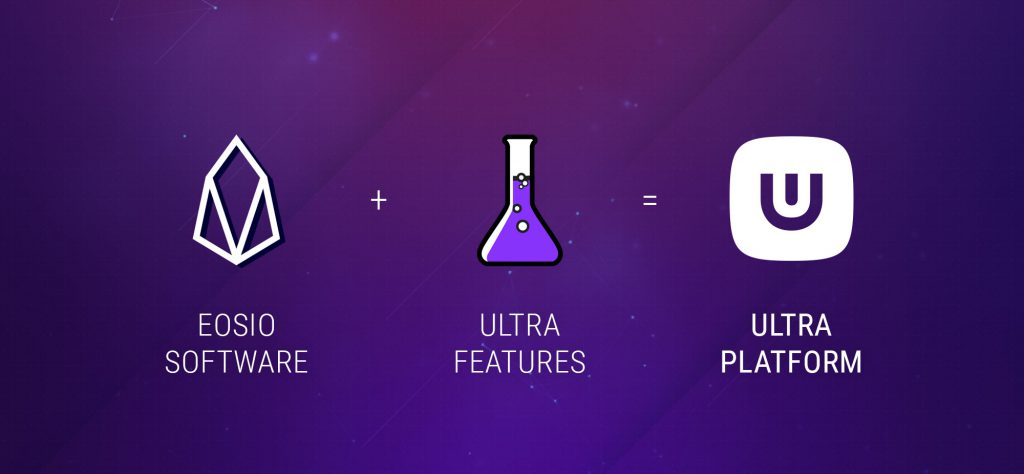
Nicolas and David, our Co-CEOs, have worked together on a number of projects in the past, including game studios, a monetization strategy company and a large scale game console project for the Chinese market. This game console project included the development of a custom APU (GPU+CPU on a single chip) – the combination of this with the software platform is essentially a game distribution platform.
They understood that from their developers’ and players’ perspectives, a one stop solution for all the gamers’ needs would drastically improve a number of things: the user experience would be better than before; the number of possible business interactions would increase; the cost of marketing would be lower; the revenue for ecosystem actors (game developers, publishers, influencers) would be streamlined and potentially increased; and, perhaps most importantly, the players could be deeply involved in this new economy.
“How great would it be if you could buy a game, play it with friends, participate in a tournament, earn virtual items in the process that you could then resell, then watch a livestream of your favourite esports team… all seamlessly on one platform?” That’s what we had in mind while we were building Ultra Games and its framework.
Innovation is at the core of our DNA. Blockchain is the new frontier in the video game industry – it offers an incredibly fertile playground for innovative companies. In a world driven by collaboration, user generated content, influencers, and “we economies”, nothing is more fun and exciting than blockchain.
We chose EOSIO because it’s the only blockchain technology capable of delivering mass market needs: account management, high transaction throughput, and short transaction confirmation time, all in a well known and mature programming language (C++).
Furthermore, while doing our research about which blockchain technology Ultra should use, EOSIO appeared to have one of the most active and welcoming communities.
We’ve changed the resource allocation related to the RAM, the CPU and the network bandwidth, and repackaged it into a more commercially driven product to fit Ultra’s corporate needs. All users of Ultra will get a daily free transaction quota, while application developers have access to a framework allowing them to decide if they want to sponsor free transactions on their own applications to valuable users. When the network is uncongested, free transactions will be available to all actors on all applications including sponsored ones.
Users with particular transaction needs can stake UOS tokens to secure their ability to perform transactions beyond their free quota and in case of network congestion.
During network congestion, our protocol modifications ensure 100% of CPU capacity is being used. This means as many transactions can be executed as possible, according to certain priority rules we’ve set in place.
We also made amendments to the governance system – Ultra needs to maintain a degree of control over what happens on the platform to be able to deliver a proper corporate-grade business environment. We removed the Block Producers voting mechanism and manually designated our first BPs including well-known actors of the video game and blockchain industries such as Ubisoft, Bitfinex, EOS NY and EOS Rio.
This isn’t to say that UOS tokens will never have a voting privilege; we just believe that at this point in time, there are no models which have been proven sufficiently reliable enough to suit our corporate partners’ standards. We’ll keep an eye on the work and research being done in this field. In the meantime, we have decided to protect our corporate partners’ interests by manually giving their transactions various privileged mechanisms we’ve put in place on the Ultra blockchain network.
The project started in 2017 and we have more than 50 people working full-time on Ultra. We have over 150 game developers and publishers signed up, and several big partners such as AMD which are all pushing forward to make Ultra the leader in the space combining blockchain and video games.
We are currently running a closed beta with selected partners that covers Ultra Games, allowing us to gather feedback and improve the current functionalities before the platform launch. The team will unveil more information as time goes on about the key features of Ultra and its vision, which goes beyond the games industry.
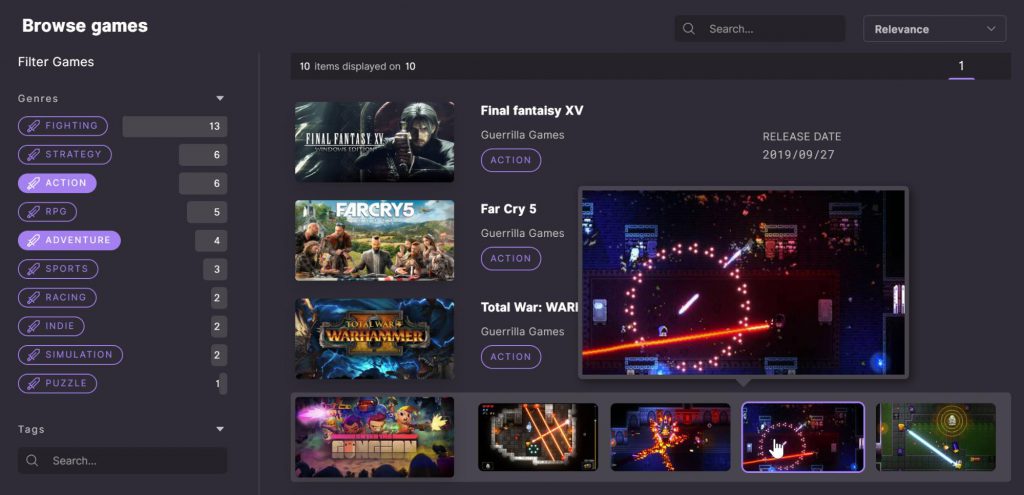
Building a large team from scratch for an ambitious project is not easy – particularly with so many new members. No matter their background, anyone who joins us has a lot to learn.
We hired incredible people, such as our CTO Michael Dunn and our Head of HR Paul Horrel, who are used to dealing with those challenges in other companies. Organizing workflow and development processes were key to building momentum and streamlining the inclusion of these new team members.
The team is doing well and keeps growing steadily, becoming more efficient and productive every day. We are also looking to open a second office in Europe to increase our hiring capabilities.
Everything we have built from day one has been done with millions of concurrent users in mind. We’re using modern technologies to be able to provide our services to an internet-scale user base, to all platforms in optimal conditions.
Business-wise, our partnerships with large tech and gaming companies, such as AMD and Ubisoft, will provide Ultra with major gamer acquisitions streams. Our team intends to operate the platform in Europe & North America, while operations in special markets such as China, Japan or Korea will be handled by established local operator partners. Some of these partners are already signed although we haven’t announced them yet.
Ultra’s scaling needs required us to build out our core technology platform on one side, which includes the blockchain technology, but also what goes around it such as our software development kits (SDKs). Then, on the other side, we needed to sign the right regional partners to operate Ultra, who will deal with day-to-day operation needs.
We’ve participated in many meetups, and are also planning on organizing some hackathon events to coincide with the launch of our main EOSIO blockchain network.
The EOSIO community is by far the most enthusiastic community about Ultra. We’re astounded by how supportive members have been since the beginning. Currently, we’re in discussions with many Block Producers and projects from the EOSIO ecosystem.
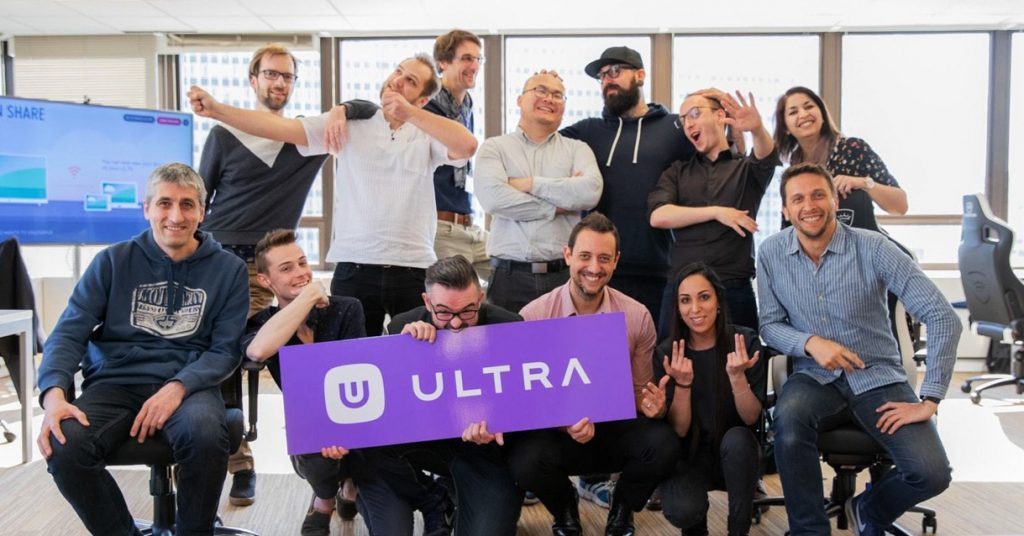
Nicolas Gilot and David Hanson, our Co-CEOs, have been working together for many years across several different business ventures. Their executive experience spans IT hardware, SEO, as well as mobile and PC game development.
David is a product visionary and Nicolas is managing business, operations and our strategy. It’s usually very hard to have all the key components of success, the vision of what the future is and the ability to create it by being grounded in the present… We manage to cover more bases by working as Co-CEOs.
Our CTO Michael Dunn is an accomplished technology executive, having previously been CTO at Dell, Time Warner and other large corporations. He’s also a member of the W3C organisation and a Techstars mentor. Mike has experience working with startups but also with the largest tech companies in the world, and is deeply interested in machine learning and AI. He is the perfect fit to transform Ultra’s vision into reality.
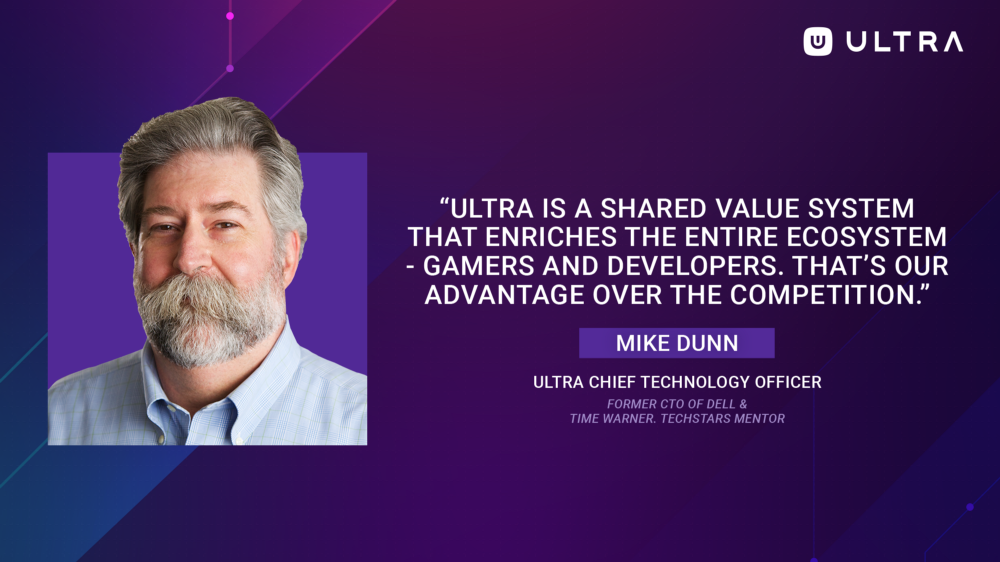
Edward Moalem, our Chief Strategy Officer, was formerly in charge of game initiatives and content at Apple and Google. He has acquired games and brokered deals with most of the largest companies in the space.It was Edward’s expertise and connections that helped Ultra sign over 150 developers, publishers and major partners.
We feel privileged to attract so many unique and highly talented people to work for Ultra to help us achieve our vision together. They are all passionate about video games and want to change the industry for the better.
After initially announcing EOS NY, EOS RIO and Bitfinex as our first Technical Block Producers, we have recently announced Ubisoft as the first Corporate Block Producer for Ultra, with more to come.
We also announced a marketing and distribution partnership with global technology giant AMD. We will work together on co-marketing activities such as contests and events to promote the use and proliferation of blockchain-based gaming technologies. AMD will also distribute codes to their customers which can then be redeemed for games on the Ultra platform, and provide prime access to Ultra for their entire user base.
The partnerships we have already announced with world leading companies in the technology and video games sectors are a testament to Ultra’s potential. We are also in discussion with a number of game developers and other potential partners.
As our profile grows in the EOSIO community, we are finding many potential synergies that we are actively exploring.
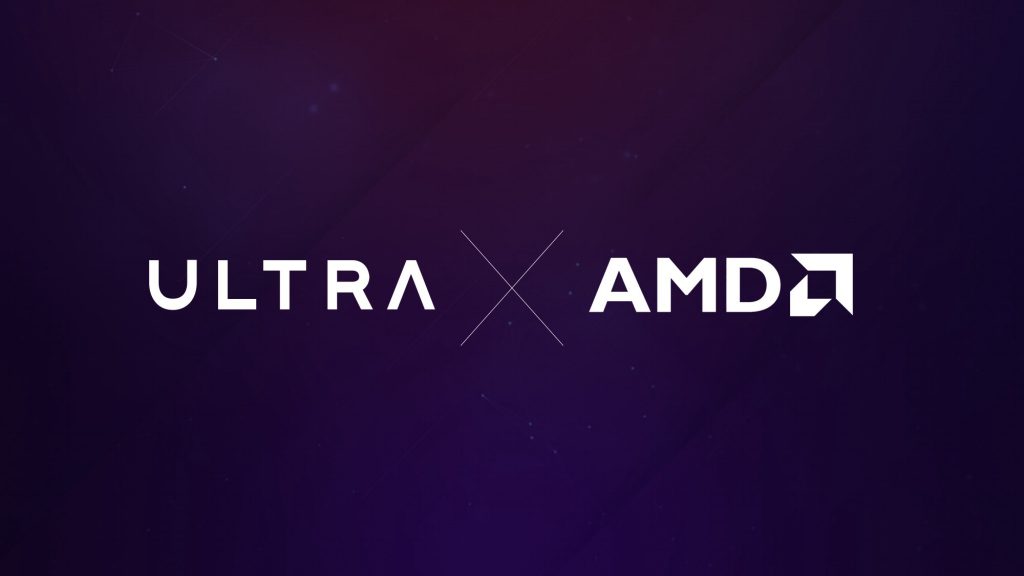
Just as the internet introduced Massive Multiplayer Online Role Playing Games, Esports, and F2P games, Blockchain technology will give us new types of games too. It will change the video game industry in so many ways, including some that we can’t even imagine yet.
Once we begin seeing games add blockchain features and making additional revenue, we will see a wave of changes. As more developers embrace new ways of creating and distributing value, new solutions will emerge, which will slowly but surely change the way they make games and monetize them.
The main impact will be on how players interact with games and their associated services. Whether they are a contributor, team member or streamer, they will truly become part of the ecosystem, without needing to understand what blockchain is. They’ll simply be able to enjoy all the new features provided thanks to EOSIO technology.
We hope that Ultra will first be a bridge between the world of blockchain technology, game developers and players. By allowing people to interact easily, we intend for Ultra to become the platform of choice to create or recreate new games, thanks to the rich set of features offered by EOSIO.
We would love for Ultra to become a part of a gamer’s lifestyle. A place where they can chat with friends, buy games, generate money or rewards, as well as engage with their favorite influencers and game developers.
We want Ultra to be beneficial for EOSIO and blockchain adoption by onboarding as many gamers as possible, so join us as we build the future of gaming!
. . .
More information and the latest updates can be found on the Ultra website.
Our #BuiltOnEOSIO series showcases some of the amazing projects leveraging EOSIO technology to build a more secure and connected world. If you would like to suggest a project for us to feature please send an email to [email protected] for our Developer Relations team to review.
Important Note: All material is provided subject to this important notice and you must familiarize yourself with its terms. The notice contains important information, limitations and restrictions relating to our software, publications, trademarks, third-party resources and forward-looking statements. By accessing any of our material, you accept and agree to the terms of the notice.